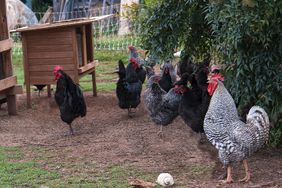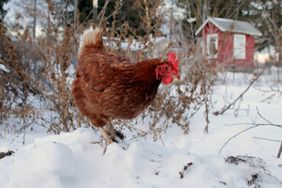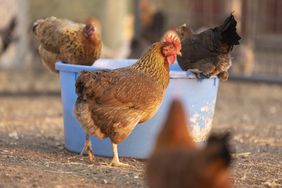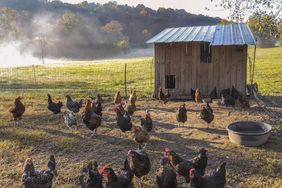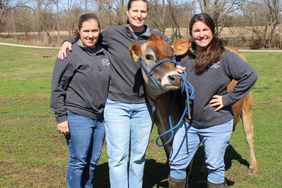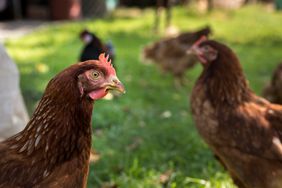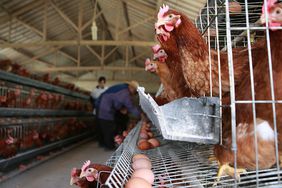:max_bytes(150000):strip_icc()/img_4dcd24932e822_16545-d8acd68f29be4eb8ae37926e35f1f4de.jpg)
While most often thought of as barnyard birds, chickens are found in urban, suburban, and rural environments across the country – and for good reasons! Chickens produce fresh eggs for their owners to enjoy themselves or sell, provide a natural form of pest control, and make fun, inexpensive, and easy to care for pets. There are many varieties of chickens, and one of the most unique, beautiful, and friendly is the silkie chicken. It is because of these qualities that silkie chickens are an excellent pet choice for novice and seasoned chicken owners alike.
The silkie (sometimes spelled Silky) chicken is an old breed of poultry that originated in Southeast Asia sometime before the 1200s; the breed is aptly named for its fluffy plumage that is said to feel like silk. Silkies are also unique because of their dark blue flesh and bones, blue earlobes, five (as opposed to four) toes on each foot, and their inability to fly. It is quite difficult to tell the difference between male and female silkie chicks because they take longer to mature than most other chicken breeds; however, once they are mature, males (roosters) and females (hens) do have some distinct differences including: roosters tend to be larger than hens, the comb will be larger on a male than on a female, and males will crow while females will lay eggs.
Silkies were officially accepted into the North American Standard of Perfection in 1874. Today, silkie chickens come in bearded and non-beaded varieties and can be seen in poultry shows across the United States. The American Bantam Association accepts six standard colors of Silkies for showing: black, blue, buff, white, partridge, splash and gray. However, there are also some non-standard, yet, popular colors. These popular non-standard colors are red, lavender, porcelain and cuckoo. A common question associated with silkies, and chickens in general, is do they make good pets? The answer is absolutely yes for the following reasons:
Silkie chickens are inexpensive to keep
Silkie chickens are extremely affordable pets to own, especially when considering the benefits of keeping them such as access to fresh eggs, pest control, and companionship. Silkies need a chicken coop, which should be a onetime expense, fresh food and water, and the occasional dust bath to keep mites at bay. A small fence should also be put up around the area silkies will be allowed to roam. Fortunately, all of these expenses – including the coop and fence – can be kept to a minimum by purchasing premade, simple products or constructing them at home. Chicken feed is quite cheap when purchased, and silkies can also eat scraps from your home and insects they find themselves (hence the natural form of pest control).
Silkie chickens are easy to care for
The coop, food, and water provided to silkies should be kept as clean as possible to ensure the birds stay content and healthy. Silkies should also be looked over weekly for mites, lice, and changes in health; should lice or mites be found, the entire flock should be treated, which is relatively easy and inexpensive. Silkies are hardy and resilient, and they are able to thrive in both cold and warm climates. These chickens are long-lived, often having life spans up to around nine years old, and continue to stay beautiful even when older.
The fact that silkie chickens are unable to fly due to their fluffy plumage makes them the easiest of all chickens to keep as pets because they are that much easier to contain. Silkies are also known for their calm, friendly temperament, which makes them exceptionally great pets for homes that have children. In fact, silkies can be quite affectionate if owners take the time to handle them often.
Silkie chickens provide many benefits to their owners
Besides entertainment and companionship, silkies can provide their owners with tangible benefits, which makes keeping silkies as pets all the more rewarding. Silkies can be entered into poultry shows, which can become a fun pastime to get involved in, and they also provide a natural form of pest control as they gobble up any insects they find. And probably the largest benefit, silkies provide their owners with fresh eggs to eat themselves or sell.
Silkies are excellent layers of relatively large-sized bantam eggs, and unlike most other breeds, silkies will continue laying eggs throughout the winter because their fluffy feathers keep them warm and content. In addition to being great egg layers, silkies are known for being the broodiest of all chicken breeds and are often used to incubate and raise the offspring of other poultry.
Only purchase silkie chickens from reputable breeders
Even though silkie chickens are easy, fun, and inexpensive to keep as pets, it is possible to obtain sickly chickens, which makes it much more difficult and expensive to keep a flock healthy. This means that when purchasing silkie chickens, potential owners should only work with reputable breeders. One indication that you are working with a reputable breeder is if the breeder's flock is NPIP certified. The National Poultry Improvement Plan (NPIP) provides certification that poultry and poultry products destined for interstate and international shipments are disease free. In order to be a NPIP flock, requirements include Annual P-T Testing, AI Testing, Annual premises Inspection, and Annual Records Audit.
